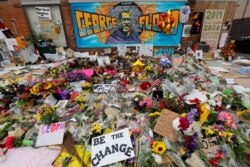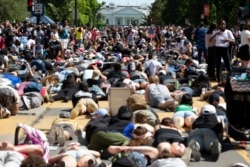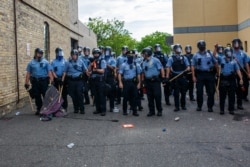Congressional Democrats called for the biggest overhaul of the country’s policing laws in decades Monday, setting up a new clash with President Donald Trump, who is demanding tough law enforcement.
“The world is witnessing the birth of a new movement in our country,” Rep. Karen Bass, one of the co-sponsors of the legislation, told reporters, “People marching to demand not just change but transformative change that ends police brutality, that ends racial profiling and ends the process of denying Americans the right to have the ability to sue when they have been injured by an officer.”
In the wake of the death two weeks ago of George Floyd, a 46-year-old black man held in police custody in Minneapolis, Minnesota, Democrats in both the House and Senate are aiming to broaden police accountability, track “problematic” officers through a “national police misconduct registry” and end the practice of transferring military equipment to police departments across the nation.
Democrats have scheduled hearings beginning Wednesday in the House of Representatives and hope to pass what they are calling the “Justice in Policing Act of 2020” by the end of this month. To become law, the bill would also have to be passed in the Republican-controlled Senate, where a hearing on policing is scheduled for next week.
Past congressional attempts at police reform and gun control legislation have failed, however, and the extent to which Republicans might join in the effort to approve policing reforms is unclear. Congressman Kevin McCarthy, leader of the minority House Republicans, says he believes the two parties “can find common ground.”
But Republicans often take their cue on legislation from Trump, who said on Twitter Sunday, “I want great and well paid LAW ENFORCEMENT. I want LAW & ORDER!”
Sleepy Joe Biden and the Radical Left Democrats want to “DEFUND THE POLICE”. I want great and well paid LAW ENFORCEMENT. I want LAW & ORDER!
— Donald J. Trump (@realDonaldTrump) June 7, 2020
In the outline of their legislation, the Democrats said, “Persistent, unchecked bias in policing and a history of lack of accountability is wreaking havoc on the Black community. Cities are literally on fire with the pain and anguish wrought by the violence visited upon black and brown bodies.”
The legislation seeks to ban chokeholds, carotid holds and no-knock warrants in drug cases at the federal level, while pressuring state and local governments to enact similar prohibitions by withholding federal funding for police forces.
Already, some local governments have banned police from using the type of restraint tactic that led to Floyd’s death. He was held down while handcuffed on a Minneapolis city street by a white police officer, Derek Chauvin, who pressed his knee on Floyd’s neck for nearly nine minutes even as Floyd repeatedly said he could not breathe.
Chauvin has been charged with second-degree murder in the case, while three police colleagues who did not intervene to assist Floyd have been charged with aiding and abetting the killing.
Anger over Floyd’s death and police brutality against minorities have led to two weeks of demonstrations in the U.S. and around the world, some of them erupting into violent clashes between protesters and police. In in recent days, the protests have mostly been peaceful.
The coast-to-coast protests have been some of the most widespread in the United States since the extended demonstrations against American involvement in the Vietnam War in the 1960s.
“When the people are marching in the streets it’s because they’re fully aware of the history of this issue in America and they have had enough,” Senator Kamala Harris, a leading contender to be presumptive Democratic nominee Joe Biden’s pick to be vice president, said Thursday.
Democratic leaders called on Senate Majority Leader Mitch McConnell to bring the legislation up for a vote on the Senate floor by the end of July. But Harris noted a measure making lynching a Federal crime failed in that chamber just last week.
The Democrats’ legislative proposal seeks to make it easier to hold police officers accountable for their actions. It would change the legal doctrine of “qualified immunity,” which often shields officers from civil lawsuits brought by people who believe they have been wronged by police actions.
In another provision, victims would need only to show that police “recklessly” deprived them of their civil rights, easing the current statute requiring them to prove that police action was “willful.”
In the aftermath of Floyd’s death, some activists have gone substantially further than the proposed legislation, with calls to “defund the police.” Some activists say the goal is not to dismantle police forces entirely, but to redirect some funding from police departments to other providers of social, educational, housing and community services.
House Speaker Nancy Pelosi once again declined to directly answer if she supported defunding the police. Instead, Pelosi said House Democrats had several proposals in the works that would address some of the social issues protesters say should be funded instead of the money that now goes to local police departments.
The Minneapolis city council says it is planning to eliminate its municipal police force, while the mayors in the two biggest U.S. cities — New York and Los Angeles — say they will cut police funding in favor of more community programs in impoverished neighborhoods.
Trump disparaged the idea in a tweet Monday, saying, "LAW & ORDER, NOT DEFUND AND ABOLISH THE POLICE. The Radical Left Democrats have gone Crazy!"
LAW & ORDER, NOT DEFUND AND ABOLISH THE POLICE. The Radical Left Democrats have gone Crazy!
— Donald J. Trump (@realDonaldTrump) June 8, 2020
Acting Homeland Security chief Chad Wolf, on the "Fox News Sunday" show, called the defunding idea "absurd."
“It makes no sense to me,” Wolf said. "It's a political statement."








